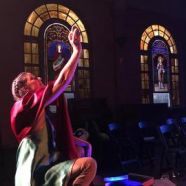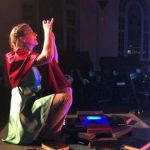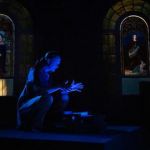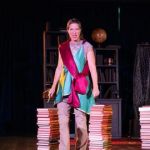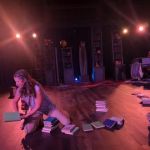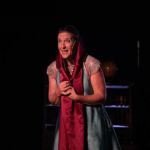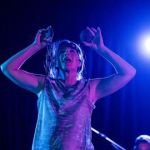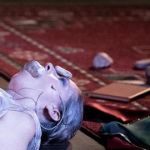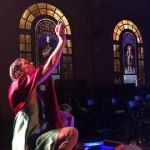Traveling the Road to Damascus
Damascus.
What does that word bring up for you?
A city in Syria?
One of the oldest cities on Earth?
One of the sites of the Arab Spring, where a civil war has been raging for almost twelve years now?
(Syrians do not use the word “Damascus” for their city; it is called ash-Sham by Syrians and folks throughout the region.)
Or do you, like me, go back to a story told in Bible school about a man named Saul who was blinded by a great light on the road to Damascus, changed his name to Paul, and became one of the most prolific early Christians, church planners, and epistle writers of the new millennium?
My association with Damascus stems from my Christian church upbringing (both my father and grandfather were Southern Baptist preachers). My father, James Richard Randels Sr., who transitioned in 2018, served Lakeview Baptist Church in New Orleans, Louisiana—a Hurricane Katrina casualty, and the church I grew up in—for thirty-seven years. He also served as the executive director of the New Orleans Federation of Churches for a decade at the end of the twentieth century. My dad was a moderate Southern Baptist. That means he separated from the fundamentalists when they took over the Southern Baptist Convention in the 80’s and in national politics, he voted for and loved Jimmy Carter; but he voted republican in most of the presidential elections post-Carter, except for the 2016 election when he proudly voted for Hillary and gave his three daughters and one of his sons a huge sense of relief!
Dad was a storytelling preacher. He grew up in a tiny town in northwest Oklahoma, and about one-third of his sermons referred to something that had happened to him up there or while working on his uncle’s farm from the age of ten onward. Context was everything for him; he called it chasing rabbits—following all the threads of a story that are needed to make a complete yarn.
I too am a storyteller. Damascus and Dad are the first two threads in this yarn. Another one is my medium: theater and performance. I’ve been making performances most of my life. Performance work is most fulfilling to me when it connects to something in our society that isn’t working; something that needs to be re-envisioned. Often, the impulse for those pieces is a personal experience, my own or a collaborator’s, that connects to a larger challenge in our community, or society as a whole. Living through Hurricane Katrina and its aftermath with my family, friends, and city led to a series of performances about land loss, culture, and civic infrastructure failure. My first major performance grew out of being discarded by my first lover while I was in college. That breakup led to conversations with friends who had encountered varying degrees of sexual trauma. Rage Within/Without began as my senior thesis performance at Northwestern University in 1991. It explored anger, aggression, and violence in women and what makes women kill. Interviews with two women who were part of the Illinois Clemency Project for Battered Women were added to the piece in 1994. I toured it for twelve years, and in 1996, it led me to a six-month performance workshop at the Louisiana Correctional Institute for Women (LCIW) in Louisiana. That has since turned into a twenty-seven-year engagement called the LCIW Drama Club.
Recently, one of the women in the Drama Club, Gloria “Mama Glo” Williams, who served the longest sentence at LCIW at fifty-two years, was released in January 2022. After a three-year effort by the Free Mama Glo Coalition made up of myriad people and organizations to release her after she was pardoned by the Louisiana pardon board, the governor finally signed her clemency papers. About a year into the governor withholding his signature, some ministers from the northern part of our state asked him what it would take for him to sign Mama Glo’s pardon. He said, “A Damascus experience.” And our sister organizations PDMNOLA and the Graduates replied, “well then let’s give him one!” I had already been working on this piece in my mind’s eye. That was a long thread and one of the blinding light moments that ordained my path.
Another thread came during Donald Trump’s presidency. I’d been aware of the racism in every system in our country for decades. I had even created performance work that looked at it in multiple realms: education, the environment, civic leadership, history, public health, and the prison system. But the marriage of political power with white Christian nationalism that declared open season for police brutality toward Black bodies appalled me to my bones and illuminated for me the truth that we as a country will never legislate racism away. (I later learned that Dr. Martin Luther King Jr. basically came to the same conclusion in 1966.*) We have tried to legislate racism out of our country for centuries; well, I should say, some of us have. And some of us have joyfully, some with complicity, and even some unintentionally, kept racism front and center in every system of our republic.
At some point in 2017, I had begun to see Saul/Paul’s conversion experience as a powerful spiritual call to white Christians. I began to dream of creating a performance that would share my journey with Christianity alongside my journey of working with incarcerated (mostly Black) women in Louisiana. At that time, my church, St. Charles Ave. Baptist, began an inquiry into systemic racial inequity in our nation, and especially its criminal legal system, by reading Michelle Alexander’s The New Jim Crow. Our pastor, Elizabeth Lott, along with congregation member Becky Meriwether, invited our congregation to participate in an Undoing Racism workshop led by The People’s Institute for Survival and Beyond (PISAB). I had done several PISAB workshops since 1998, but never dreamed that I would be a part of a church that would voluntarily go through it together! In 2020, over Zoom, Pastor Elizabeth led our church, along with two others, in reading White Too Long: The Legacy of White Supremacy in American Christianity, Robert P. Jones’ deep investigation of racism in the American church since the country’s inception. The research was there and my mind was blown.
But I needed one more thread. That thread came from performer training, which involved somatic and healing practices that I started doing with Odile Nicole Del Giudice in 2017. In the fall of 2020, shortly after my fifty-first birthday and shortly after my ninety-year-old mother died, I told Odile I wanted to make something. I needed to do more than train. I needed to make a new piece. My mother’s passing left me hollow. COVID was here and stifling and weird and subjected me to a lot of cave time, which is great for the creation of a performance. It allows for in-depth research and rehearsal. I needed a goal, a container for all of these threads that I could ultimately share with my community. I felt called to create a “Damascus experience” not just for my governor, but for white churches in Louisiana, heck in all of America, to mirror our damaging actions to the descendants of enslaved Africans, to uproot racism in our church’s gestalt, and, even more specifically, to invite the church to reimagine** the prison system in our state and country. Odile said, “Let’s do it!”
We created the performance The Road to Damascus (as told by Grandmother to Little Red), which uses the story of Saul/Paul’s conversion experience as described in Acts 9 of the New Testament as a call for an awakening to the role the church has played in creating and sanctifying our country’s inequitable criminal legal system. In the performance, Grandmother is an incarcerated woman who tells the story of Saul/Paul’s conversion experience to her granddaughter during prison visits as a way to illuminate the persecutorial nature of the system in which they live. They acknowledge one another’s sexual traumas and share stories of encounters with the Wolf and the Huntsman that leave questions as to which of these two figures is predator and which is savior. Grandmother casts her prison guard, who happens to be named Saul, as the Huntsman in the tale she weaves for Little Red Riding Hood. Through the telling of the tale, we examine the perpetrator/victim/savior dynamic that is present in both stories, in ourselves, and in our national consciousness. At a time when Christianity is increasingly polarized by political interests and parties, this performance calls on Christ’s deepest teachings to help us look at the role we have each played in crime and punishment, harm and healing, and invites us to deepen our collective ability to look at and begin to heal the harm that has been done to our nation and its citizens in the name of Christianity.
We premiered the piece on the seventeenth anniversary of Katrina: August 29, 2022. We got a lot of feedback from my church members, from other New Orleans church folk, from my theater community, and from our criminal legal system reform community. In March 2023, we remounted the piece in New Orleans and toured it to Baton Rouge as well as to the James Chapel at Union Seminary in New York City, which was the first time Mama Glo got to see the performance. She is FREE! She and her sister Mary Smith-Moore spoke after each of our performances and shared with the audience the challenges of those fifty-two years of incarceration from Mama Glo’s perspective as well as from her family’s perspective: doing time with her on the outside. They also spoke to what gave them the strength to continue, to stay hopeful despite the horrors of the prison system. The next phase of the project will be a tour to churches throughout Louisiana in the fall of 2023. And then we plan to tour the piece throughout the South, in Texas and Oklahoma, and throughout the Northeast in 2024–25.
Story weaving is hard, delicate work. Sometimes, creating the space to untangle threads is an essential part of the preparation for braiding. For me, art and community are tightly woven together; they are essential to one another, and yet sometimes we need to devote our attention to one at a time to be able to discern how they can best serve one another. I am grateful for the example of storytelling that my father, Pastor Elizabeth, Mama Glo, and thousands of others have shared with me throughout this lifetime. My prayer is that The Road to Damascus can be revelatory and healing for all who encounter it, as it has been for me and our team.
* “We realize that if the problem is to be solved ultimately, if we are to have a truly integrated society, men and women must rise to the majestic heights of being obedient to the unenforceable. And I would be the first to acknowledge that. So it may be true that you can’t legislate integration, but you can legislate desegregation. It may be true that morality cannot be legislated but behavior can be regulated. It may be true that the law cannot change the heart but it can restrain the heartless. It may be true that the law cannot make a man love me, religion and education will have to do that, but it can restrain him from lynching me.” —Rev. Martin Luther King Jr.
** “Reimagine the criminal legal system” is a phrase first used by Caroline Durham, the executive director of the St. Charles Center for Faith + Action, a progressive organization founded by our church.
*** If you are interested in bringing this piece to your community or your church, please feel free to email Kathy at kathy@artspotproductions.org and write “Road to Damascus Inquiry” in the subject line. To read more about this piece and our other work, please visit artspotproductions.org.
All photographs by Shannon Brinkman and video artistry by Zach Kanzler


